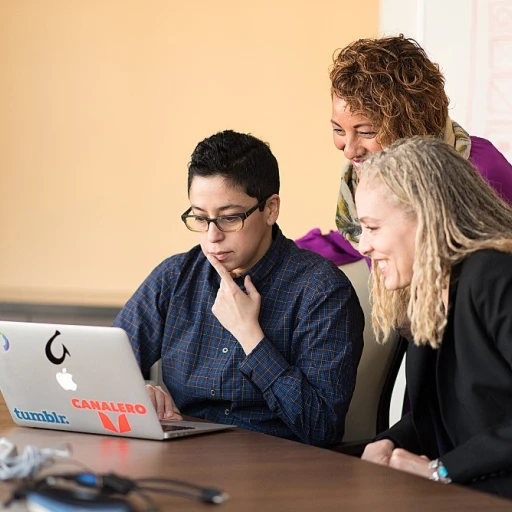
Understanding the Role of a Seminar Leader
Defining the Seminar Leader's Role
Being a seminar leader is more than just standing in front of a group and delivering information. It involves guiding participants through a learning journey, ensuring that each individual gains valuable insights and skills. Seminar leaders are responsible for creating an environment conducive to learning and engagement, which requires a deep understanding of both the subject matter and the dynamics of group interaction.
Key Responsibilities
Seminar leaders must wear many hats. They are educators, facilitators, and sometimes even mediators. Their primary responsibility is to ensure that the seminar's objectives are met while also catering to the diverse needs of participants. This involves:
- Preparing and organizing the seminar content to align with the learning goals.
- Facilitating discussions that encourage participation and critical thinking.
- Adapting teaching methods to suit different learning styles.
- Managing time effectively to cover all planned topics.
Creating a Learning Environment
Successful seminar leaders understand the importance of creating a space where participants feel comfortable and motivated to learn. This involves setting clear expectations, fostering open communication, and encouraging collaboration among participants. By doing so, seminar leaders can enhance the overall learning experience and ensure that each participant leaves with a deeper understanding of the subject matter.
For those interested in further exploring the role of a seminar leader and how it fits into broader leadership development, the Boston Leadership Institute offers valuable insights into effective leadership pathways.
Essential Skills for Effective Seminar Leadership
Key Competencies for Leading Seminars
To excel as a seminar leader, one must develop a set of essential skills that are crucial for effective leadership. These skills not only enhance the seminar experience for participants but also contribute to the leader's personal growth and professional development.
Communication and Presentation Skills
Clear and engaging communication is at the heart of successful seminar leadership. Leaders must be adept at presenting complex ideas in an accessible manner, ensuring that all participants, from students to seasoned professionals, can follow along. This involves not just speaking clearly but also listening actively, responding to questions, and facilitating discussions that encourage diverse perspectives.
Facilitation and Engagement Techniques
Effective seminar leaders employ a variety of facilitation techniques to keep participants engaged. This includes using interactive activities, group discussions, and multimedia resources to cater to different learning styles. Leaders should be prepared to adapt their approach based on the dynamics of the group and the subject matter being covered.
Time Management and Organization
Managing time efficiently is crucial in ensuring that all planned topics are covered within the seminar's duration. Leaders need to be organized, setting clear agendas and sticking to them while allowing for flexibility to explore interesting tangents that may arise during discussions.
Emotional Intelligence and Empathy
Understanding and managing one's emotions, as well as empathizing with participants, are vital skills for seminar leaders. This emotional intelligence helps in creating a supportive and inclusive environment where participants feel valued and motivated to contribute.
Continuous Learning and Adaptability
Leadership development is an ongoing journey. Seminar leaders should be committed to continuous learning, seeking feedback from participants and peers to improve their skills. This adaptability ensures that leaders remain relevant and effective in their roles. For more insights into developing these competencies, consider exploring the ASTS Leadership Development Program.
Strategies for Engaging Participants
Engaging Techniques for Seminar Leaders
Crafting an engaging seminar doesn't happen by chance; it involves strategic planning and execution tailored to your audience's needs. As a seminar leader, building a connection with your participants is paramount. With the abundance of leadership development resources available, finding the right approach can transform your seminar into an enriching learning experience. One effective strategy is establishing an interactive environment where participants feel comfortable sharing their thoughts. Interactive activities encourage learning and keep participants actively involved. Group discussions are invaluable; they foster collaboration and stimulate critical thinking among students. Another best practice is incorporating real-world scenarios in the curriculum. When students can relate theoretical concepts to practical applications, it deepens their understanding and retention. Leaders with industry experience should share these insights to enhance seminar content, making the sessions more relatable and impactful. Visual aids and storytelling techniques can reinforce key messages, aiding in comprehension and engagement. They provide a compelling way to structure the program, capturing the attention of seminar participants. Finally, leveraging technology can greatly enhance the seminar experience. Online platforms and tools offer innovative ways to connect with a broader audience and provide flexibility in learning. Embracing these tools can transform traditional seminars into dynamic, hybrid programs. Effective seminar leaders continuously adapt their methods, catering to diverse learning styles and needs. By honing these strategies, you cultivate an environment conducive to growth and development, ensuring participants leave with valuable insights and enhanced skills in leadership discipline. To further explore leadership development approaches, see our insights on the effective succession planning for a CTO in a tech company.Overcoming Common Challenges
Addressing Common Obstacles in Seminar Leadership
Leading a seminar can be a rewarding yet challenging experience. Seminar leaders often face a variety of obstacles that can impact the effectiveness of their sessions. Understanding these challenges and developing strategies to overcome them is crucial for anyone involved in leadership development.
Managing Diverse Learning Styles
One of the primary challenges is catering to the diverse learning styles of seminar participants. Each student may have a different way of absorbing information, and as a seminar leader, it's essential to adapt your teaching methods accordingly. Incorporating a mix of visual, auditory, and kinesthetic activities can help engage all types of learners. This approach not only enhances the learning experience but also ensures that the seminar is inclusive and effective.
Handling Difficult Participants
Another common issue is dealing with difficult participants. Whether it's a disruptive student or someone who dominates the conversation, managing these situations requires tact and patience. Setting clear expectations and establishing ground rules at the beginning of the seminar can help mitigate these issues. Additionally, employing active listening and empathy can turn potential conflicts into opportunities for growth and understanding.
Time Management
Effective time management is crucial in ensuring that all seminar topics are covered thoroughly. Seminar leaders must balance the need to provide comprehensive information with the constraints of a limited schedule. Prioritizing key topics and being flexible with the agenda can help maintain the flow of the seminar while ensuring that participants will gain valuable insights.
Technical Difficulties
In today's digital age, technical issues can pose significant challenges during seminars. Whether it's a malfunctioning projector or connectivity issues in a virtual seminar, being prepared with backup plans is essential. Familiarizing yourself with the technology beforehand and having alternative resources ready can minimize disruptions and keep the seminar on track.
By recognizing and addressing these common challenges, seminar leaders can create a more engaging and productive learning environment. Continuous improvement and feedback, as discussed in other sections, are key to refining these strategies and enhancing the overall seminar experience.
The Importance of Feedback and Continuous Improvement
Gathering Insights for Leadership Growth
Feedback plays a pivotal role in the journey of leadership development, especially when it comes to mastering the seminar leader role. Within seminars, leaders must consistently seek and incorporate participant feedback to refine their strategies and techniques. This ongoing, iterative process helps seminar leaders enhance their skills, ensuring they remain effective educators and facilitators.Constructive Criticism as a Development Tool
Engaging with seminar participants is key to collecting meaningful insights. By soliciting feedback, seminar leaders can recognize areas needing improvement and adapt their approaches accordingly. Constructive criticism can serve as a fundamental resource, supporting personal growth and the honing of essential leadership skills.- Open Dialogue with Participants: Encourages trust and transparency, inspiring participants to share honest opinions about their learning experience.
- Anonymous Surveys: A useful tool for collecting unbiased feedback, allowing students to provide candid responses without fear of judgment or repercussions.
- Post-Seminar Discussions: Facilitates a collaborative environment where participants can reflect on the seminar content and share their thoughts.
Commitment to Growth Through Continuous Improvement
Commitment to continuous improvement distinguishes effective seminar leaders from their peers. Leaders must leverage feedback to foster ongoing progress and adapt to evolving educational landscapes. This commitment aligns with best practices in leadership development, where a proactive mindset leads to sustained growth and success. By embracing feedback and committing to continual improvement, seminar leaders can guide participants through transformative experiences. For those in leadership seminars or undergoing leader training, adopting a systemic approach to feedback ensures that both leaders and students benefit, ultimately enriching the learning process for everyone involved.Case Studies of Successful Seminar Leaders
Real-World Examples and Success Stories
Examining real-world examples and success stories of seminar leaders can provide invaluable insights into effective leadership strategies. Successful seminar leaders excel in nurturing student engagement, employing essential skills, and overcoming challenges to create impactful learning experiences.
One key factor in their success is their ability to tailor their approach to suit a diverse range of participants. They adeptly engage both seasoned professionals and newcomers in training seminars by leveraging a range of resources and development techniques. This often involves utilizing personal coaching and continuing education to remain updated on best practices within their subject matter expertise.
Moreover, accomplished seminar leaders understand the importance of fostering an inclusive learning environment. They create programs that encourage open discussion, allowing students and professionals to share insights, contribute to the conversation, and enhance learning outcomes. The leaders, in turn, gain valuable feedback, which contributes to their continuous improvement and the evolution of their seminars.
Another common trait among these distinguished leaders is their commitment to incorporating feedback loops into their seminars. By gathering constructive feedback from seminar participants, they refine and adapt their leadership techniques. This commitment to feedback and continuous improvement not only enhances their seminars' effectiveness but also solidifies their reputation as leaders in the field.
Leading successful seminars also requires the ability to anticipate and overcome challenges. Seminar leaders achieve this by collaborating with leadership teams and drawing upon experience with executive coaching and leadership seminars. They are adept at decision making, ensuring the smooth execution of seminars regardless of unforeseen obstacles.
The stories of successful seminar leaders offer a roadmap for aspiring leaders seeking to master the art of leading groups and delivering impactful seminars. By studying their approaches and adopting their best practices, future seminar leaders can elevate their own programs to new heights, contributing meaningfully to the field of leadership development.













